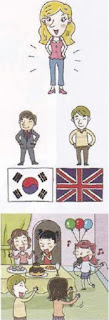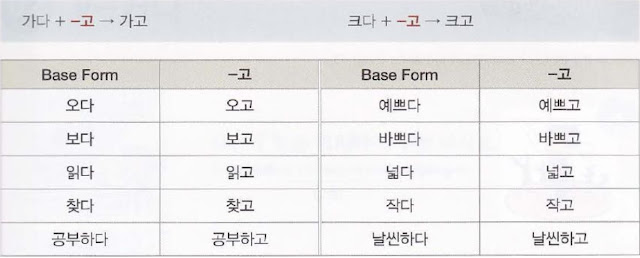 캐럴 씨는 키가 크고 날씬해요.
캐럴 씨는 키가 크고 날씬해요.
Carol is tall and slender.
민우 씨는 한국 사람이고 댄 씨는 영국 사람입니다.
Minu is Korean, and Dane is British.
어제 파티에서 티루엔 씨가 노래도 부르고 춤도 췄어요.
At yesterday’s party, Tiluen sang songs and danced.
Grammar Focus:
1. -고 is used to list two or more actions, states, or facts. It corresponds to ‘and’ in English. -고 is added to the stems of verbs and adjectives.
• 형은 커요. 그리고 동생은 작아요.
My older brother is big. And my younger brother is small.
->형은 크고 동생은 작아요.
My older brother is big, and my younger brother is small.
2. -고 is also used to express that the action in the first clause was performed before the action in the second clause. It corresponds to ‘and (then)’ in English. Tense is only expressed in the second clause, not the first.
• 어제 밥을 먹었어요. 그리고 숙제를 했어요.
Yesterday, I ate dinner. And I did my homework.
->어제 밥을 먹고 숙제를 했어요. (어제 밥을 먹었고 숙제를 했어요. (X))
Yesterday, I ate dinner, and then did my homework.
 Notes:
Notes:
The form ‘N도 Vst고 N도 V’ is used when combining two or more facts about the same subject.
• 형은 수영을 잘해요. 그리고 농구도 잘해요.
My older brother is good at swimming. And (he’s) also good at basketball.
->형은 수영도 잘하고 농구도 잘해요.
My older brother is good at swimming and also (good at) basketball.
• 저는 딸기를 좋아해요. 그리고 바나나도 좋아해요.
I like strawberries. And (I) like bananas, too.
->저는 딸기도 좋아하고 바나나도 좋아해요.
I like strawberries and also (I like) bananas.
Conversation:
A: 내일 뭐 할 거예요?
What will you do tomorrow?
B: 오전에는 친구를 만나고 오후에는 도서관에 갈 거예요.
In the morning, I’ll meet a friend, and in the afternoon, (I’ll) go to the library.
A: 어제 뭐 했어요? What did you do yesterday?
B: 피자도 먹고 영화도 봤어요. I ate pizza and saw a movie.
A: 여자 친구가 어때요? What do you think of your girlfriend?
B: 똑똑하고 예뻐요. (She’s) smart and pretty.
>> Full of ‘Korean grammar in use – Beginner’: Click here
>> Fanpage: Say Hi Korean
